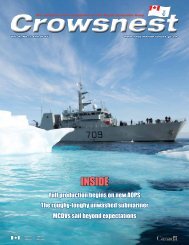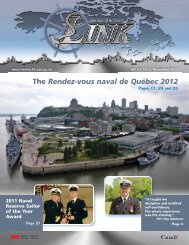Create successful ePaper yourself
Turn your PDF publications into a flip-book with our unique Google optimized e-Paper software.
3 Challenges to Order in <strong>the</strong> <strong>Maritime</strong> <strong>Environment</strong><br />
If one excludes <strong>the</strong> sea-based deterrents that were initially developed during <strong>the</strong> latter half <strong>of</strong> <strong>the</strong><br />
20 th century <strong>and</strong> that contributed to both <strong>the</strong> stability <strong>and</strong> <strong>the</strong> outcome <strong>of</strong> <strong>the</strong> Cold War, it has<br />
been seventy years since <strong>the</strong> last great international conflict in which <strong>the</strong> outcome was influenced<br />
to a considerable degree by operations at sea. It has been over three decades since <strong>the</strong> Falkl<strong>and</strong>s<br />
War (1982) so clearly demonstrated <strong>the</strong> continuing strategic utility <strong>of</strong> sea power. With <strong>the</strong> lessons<br />
<strong>of</strong> <strong>the</strong> Falkl<strong>and</strong>s largely forgotten, <strong>and</strong> as <strong>the</strong> Second World War recedes into history, many<br />
people have come to assume that <strong>the</strong> maritime realm is unchanging <strong>and</strong>, despite an occasional<br />
media focus on environmental decay or contentious boundary claims, that any problems are ei<strong>the</strong>r<br />
far away or readily manageable. Our easy familiarity with what we have has created within many<br />
Western societies what some have called maritime blindness. 56 Many <strong>of</strong> us take for granted <strong>the</strong><br />
ready abundance <strong>of</strong> all types <strong>of</strong> foods year-round <strong>and</strong> <strong>of</strong> goods that maintain our modern st<strong>and</strong>ard<br />
<strong>of</strong> living without being aware that <strong>the</strong>ir delivery depends, at some stage, on maritime transport;<br />
<strong>and</strong> we <strong>of</strong>ten fail to acknowledge that <strong>the</strong> absence <strong>of</strong> sea-based threats is <strong>the</strong> consequence <strong>of</strong><br />
efforts, in <strong>the</strong> past <strong>and</strong> ongoing, to purchase such security. In our own age, maritime strategic<br />
interests <strong>and</strong> vulnerabilities are largely overlooked. 57 <strong>The</strong> public is frequently unaware <strong>of</strong> <strong>the</strong><br />
strategic challenge that could come from <strong>the</strong> sea. Looking to history, a British naval historian<br />
recently observed that “even in <strong>the</strong> darkest hours <strong>of</strong> that campaign [i.e., <strong>the</strong> Battle <strong>of</strong> <strong>the</strong> Atlantic],<br />
when <strong>the</strong> United Kingdom stood in real danger <strong>of</strong> being starved to death, <strong>the</strong>re were far more<br />
stockpiles <strong>of</strong> key commodities—fuel <strong>and</strong> food—at any time than <strong>the</strong>re are now in 2013.” 58 He<br />
was referring to a densely populated isl<strong>and</strong> country engaged in a life <strong>and</strong> death struggle. If <strong>the</strong><br />
discussion had turned to current events, he might have drawn attention to <strong>the</strong> vulnerability <strong>of</strong><br />
many advanced economies to disruptions in seaborne trade due to energy import dependence or<br />
<strong>the</strong> just-in-time approach <strong>of</strong> <strong>the</strong> commercial <strong>and</strong> manufacturing sectors. 59<br />
Modern trade <strong>and</strong> transportation technologies, <strong>and</strong> <strong>the</strong> rising threat <strong>of</strong> remote attacks (i.e., cyber)<br />
mean that <strong>the</strong> oceans cannot provide defence-in-depth to <strong>the</strong> same degree as <strong>the</strong>y once did. But a<br />
greater awareness <strong>of</strong> vulnerability has not yet translated into a greater appreciation for <strong>the</strong><br />
strategic importance <strong>of</strong> <strong>the</strong> oceans. Any lingering inclination to assume that <strong>the</strong> oceans are a<br />
limitless resource, where inter-state competition can be easily managed, or that <strong>the</strong>y provide<br />
56 One author has described <strong>the</strong> symptoms <strong>of</strong> maritime blindness as “[t]he public’s blasé expectation that<br />
what we want will be available when we want it without being mindful <strong>of</strong> how it arrives at <strong>the</strong> table, store<br />
shelf or <strong>the</strong> assembly shop floor. (…) It also describes <strong>the</strong> lack <strong>of</strong> awareness about strategic <strong>and</strong> security issues<br />
associated with international use <strong>of</strong> <strong>the</strong> ocean commons.” See Tim Dunne, “<strong>The</strong> Sad State <strong>of</strong> <strong>Maritime</strong><br />
Blindness”, Cutting <strong>the</strong> Bow Wave (Combined Joint Operations from <strong>the</strong> Sea Center <strong>of</strong> Excellence: Norfolk,<br />
Virginia, 2013), p. 43. For <strong>the</strong> ongoing debate on this issue in <strong>the</strong> UK, see Jeremy J. Blackham <strong>and</strong> Gwyn Prins,<br />
“<strong>The</strong> Royal Navy at <strong>the</strong> Brink”, RUSI Journal (April 2007), pp. 10–16 <strong>and</strong> Lee Willett, “<strong>The</strong> <strong>Maritime</strong><br />
Contribution to <strong>the</strong> Joint Campaign <strong>and</strong> <strong>the</strong> National Security Strategy”, RUSI Occasional Paper (June 2009).<br />
57 This argument is made in Jeremy Blackham <strong>and</strong> Gwyn Prins, “Why Things Don’t Happen: Silent<br />
Principles <strong>of</strong> National Security”, RUSI Journal, Vol. 155, No. 4, August/September 2010, pp. 16–17.<br />
58 Pr<strong>of</strong>essor Andrew Lambert quoted in Christopher Bellamy, “<strong>Naval</strong> power: strategic relevance in <strong>the</strong><br />
21 st century”, Jane’s Navy International (online), November/December 2014.<br />
59 In early-2015, for example, industry leaders warned that a shutdown <strong>of</strong> <strong>the</strong> Long Beach-Los Angeles<br />
ports, through which 40 percent <strong>of</strong> <strong>the</strong> US import trade passes, would pose a severe risk to <strong>the</strong> US national<br />
economy. See Robert Wright, “Industry warns <strong>of</strong> crippling impact <strong>of</strong> work stoppage at US ports”, <strong>The</strong><br />
Financial Times, 18 January 2015.<br />
DRDC-RDDC-2016-R085 15




